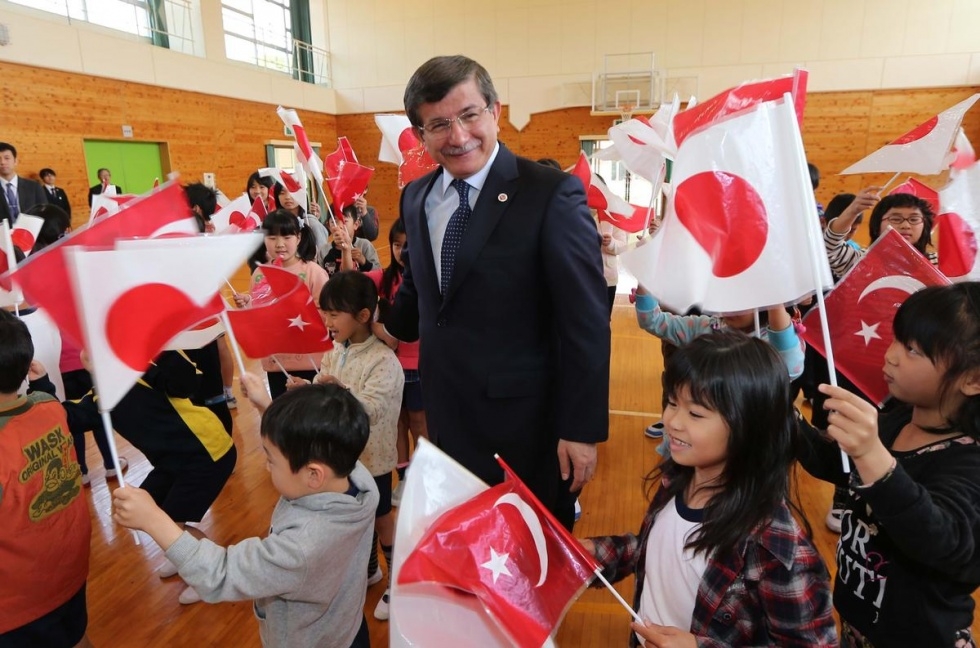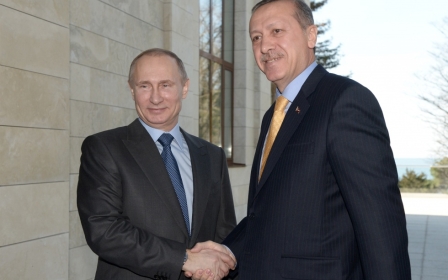Turkey foreign minister warns of 'domino effect' of Ukraine crisis

Turkey's foreign minister has warned that Russia's unilateral annexation of Crimea may lead to a domino effect in and around the Black Sea and neighboring regions of Turkey.
Speaking on a visit to Japan, Ahmet Davutoglu said: "Our concern is not only Ukraine. If this trend starts, which acts against territorial integrity, there are many other frozen conflicts like Trans-Dniester, Abkhazia and Nagorno-Karabakh."
Speaking to Japan's Nikkei newspaper, Davutoglu said Turkey respects the territorial integrity of Ukraine, internationally recognized and endorsed by the UN and does not recognize the annexation of Crimea by Russia.
Asked about his views on Russia demanding a federal state in Ukraine, he said: "Any administrative issue should be discussed within Ukraine by the Ukrainians."
Russia has said Ukraine should reform itself into a federation, but the Kiev government has refused.
Stay informed with MEE's newsletters
Sign up to get the latest alerts, insights and analysis, starting with Turkey Unpacked
From April 1, Russia increased the price of gas for Ukraine to US$485 per barrel from US$268.59, an act Ukraine’s government called ‘a declaration of economic war.’
During the 2009 Ukrainian gas crisis, the flow of Russian gas via Ukraine to Turkey had stopped.
"We have already decided to diversify both energy resources and different routes, and the nuclear plants we are building with Japan and Russia are an alternative source of energy...Concerning this particular issue, we do not expect a crisis, as there are clear agreements between Turkey and Russia."
Meanwhile, the Russian Ambassador to Turkey, Andrey Karlov, stressed that differences of opinion between Moscow and Ankara over Ukraine is not an obstacle to enhance bilateral ties between the two countries.
“Turkey embraced the attitude of NATO and EU countries. We respect Turkey’s attitude on this issue, as we do in other attitudes. Our differences on international issues will not negatively influence our bilateral relations, primarily economic ties,” the Russian ambassador was quoted as saying.
Karlov added that Russia would put Crimean Tatar’s culture and history “under protection”.
Suspicion of Moscow is high among the Tatar community, which is still scarred by memories of the en masse deportations to Central Asia carried out by dictator Joseph Stalin during World War II. Many only started returning to the peninsula in the run up to the collapse of the Soviet Union in 1991.
Crimea's Tatars -- who Ankara say make up 12 percent of the population -- have maintained their Turkic language and religion, in contrast to the mostly Russian-speaking majority population.
Crimea was part of the Ottoman Empire until it was conquered by Russia in the late 18th century. Tatars -- the majority population at the time -- have been gradually sidelined by the Russian-speaking majority since then.
Turkey has cultivated strong links with the Tatars, funding development projects including housing, roads and schools in Crimea through an aid programme based in the region's capital Simferopol.
But until recently politicians had kept quiet as the conflict escalated in Crimea.
Middle East Eye delivers independent and unrivalled coverage and analysis of the Middle East, North Africa and beyond. To learn more about republishing this content and the associated fees, please fill out this form. More about MEE can be found here.


